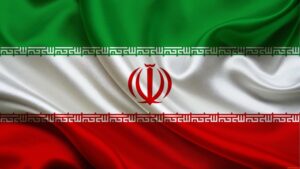
Iran has become the country with the highest level of negative attitudes among Ukrainians, according to a sociological survey conducted by Active Group and the Experts Club analytical center in April 2025.
According to the results, 60.9% of respondents rated Iran negatively (32.9% — mostly negative, 28.0% — completely negative). At the same time, only 5.0% of respondents expressed a positive attitude (2.8% — mostly positive, 2.2% — completely positive). Another 27.9% indicated a neutral attitude, and 6.2% abstained from answering.
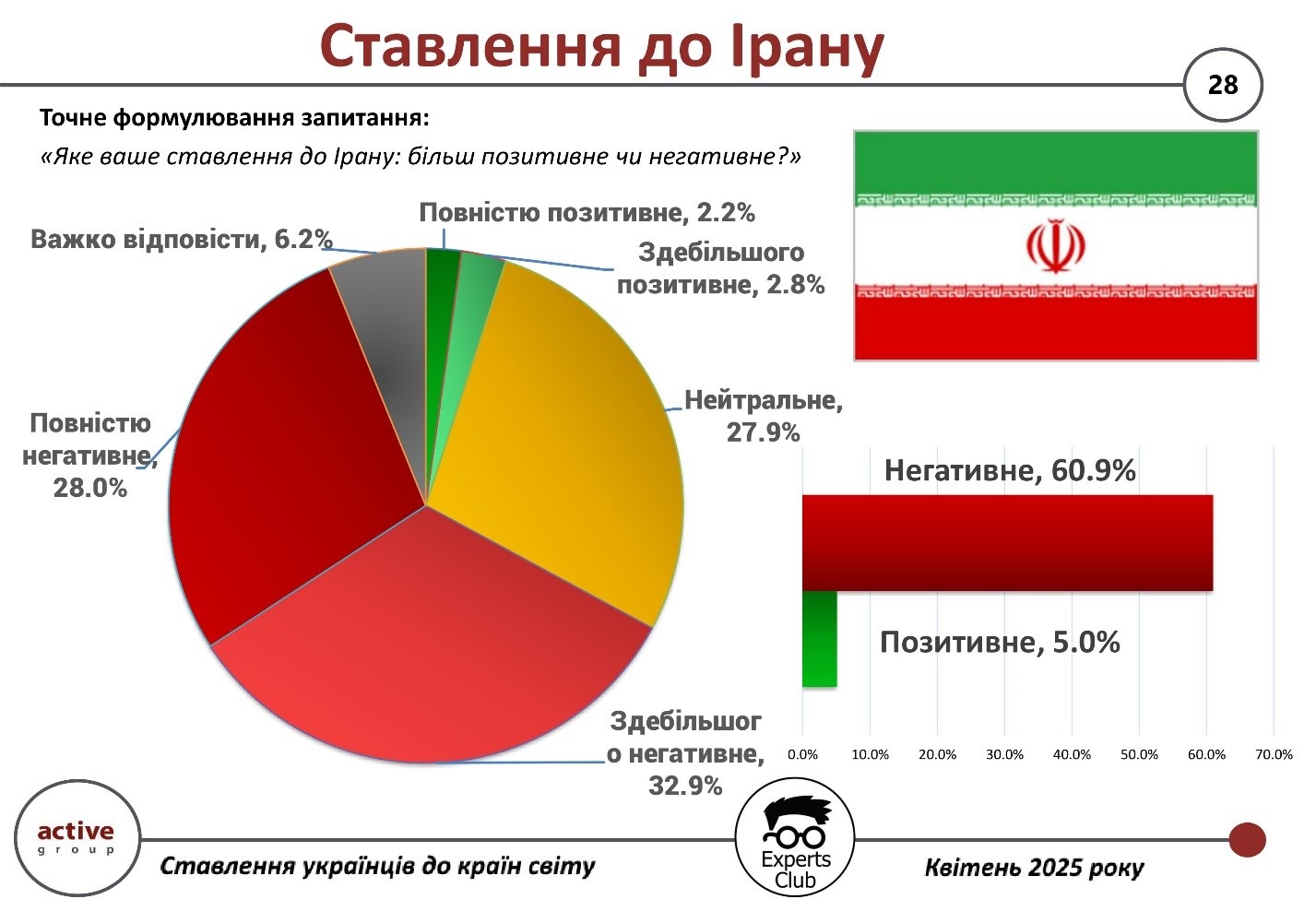
“The high level of negativity towards Iran is explained by its foreign policy and alliance with Russia. These results reflect the geopolitical reality,” said Oleksandr Pozniy, co-founder of Active Group.
The presentation of the study is available at the link.
ACTIVE GROUP, DIPLOMACY, EXPERTS CLUB, Pozniy, SOCIOLOGY, URAKIN

Reaching an agreement on a long-term ceasefire could accelerate Ukraine’s real GDP growth in 2025 to 3.5-5.5% year-on-year from 2.9% in 2024, thanks to improved economic sentiment and the start of large-scale reconstruction, which will offset the reduction in defense spending, while if the war continues, growth will slow to 2.5%, according to an updated forecast published by investment company Dragon Capital.
“Although weak economic activity in the first quarter of 2025 will be partially offset by better prospects for the energy sector, we have lowered our real GDP growth forecast for 2025 by 0.5 percentage points (percentage points) to 2.5% in the “continuing war” scenario,” the company said in a statement on Tuesday.
According to the statement, the forecast was also lowered by 0.5 percentage points in the event of a prolonged ceasefire.
According to Dragon Capital’s forecast, annual inflation will begin to decline in June-July amid continued easing of fundamental pressures and a high base of comparison in the food segment in the second half of last year.
“We forecast consumer inflation to slow to 8.1% y/y by the end of 2025 in the ‘ongoing war’ scenario and to 9-10% y/y in the ‘ceasefire’ scenario,” the release says.
Regarding the hryvnia exchange rate, Dragon Capital notes that in the first quarter of 2025, the NBU allowed the hryvnia to strengthen against the US dollar by 1.4% to 41.5 UAH/USD after a long period of controlled devaluation. The company believes that this strengthening of the hryvnia was the NBU’s response to high inflation, significant external financing, the global weakening of the dollar, and a seasonal decline in demand for foreign currency.
“We expect the NBU to return to a controlled and gradual weakening of the hryvnia in the second half of the year, when inflation rates begin to decline. However, given the significant amount of financial assistance, we have raised our forecast for NBU reserves to $59 billion (from $41 billion) and lowered our year-end exchange rate forecast to 44 UAH/USD (-4.4% y/y; previous forecast — 45 UAH/USD),” the release said.
Dragon Capital experts added that achieving a sustainable ceasefire will contribute to a slower devaluation of the hryvnia in the second half of the year, as fundamental pressure on prices will be higher and the balance of payments situation will improve due to a slowdown in private capital outflows and continued external financial assistance.
“Going forward, the exchange rate will depend on the volume of external financing and private capital flows, while the foreign trade deficit will remain significant due to structural changes in the economy,” the release said.
As reported earlier on Tuesday, the European Bank for Reconstruction and Development revised its forecast for Ukraine’s real GDP growth in 2025 to 3.3% from 3.5% expected in February and kept its forecast for 2026 at 5.0%, provided that Russia’s war against Ukraine ends.
At the end of February, the International Monetary Fund also revised its forecast for Ukraine’s economic growth in 2025, lowering it by 0.5 percentage points compared to its previous forecast to 2-3%, and the World Bank from 6.5% to 2%.
In April, the NBU worsened its forecast for Ukraine’s economic growth in the current year to 3.1% from 3.6% in its previous macroeconomic forecast in January, and in the next forecast, from 4.0% to 3.7%.

The National Bank of Ukraine (NBU) has added Insurance Broker Atrius LLC to the Register of Insurance Intermediaries in accordance with the electronic application submitted by the company. According to the central bank’s website, the NBU has removed the company from the State Register of Insurance and Reinsurance Brokers and revoked its certificate of entry in the register.
The relevant decisions were adopted by the NBU’s Committee for Supervision and Regulation of Non-Bank Financial Services Markets on May 9, 2025. Atrius LLC was registered in May 2018 in Kyiv. Its authorized capital is UAH 1,077 thousand.
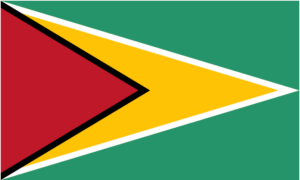
According to the results of a survey conducted by Active Group in collaboration with the information and analytical center Experts Club, the vast majority of Ukrainians do not have a formed opinion about Guyana — 71.8% chose the neutral option.
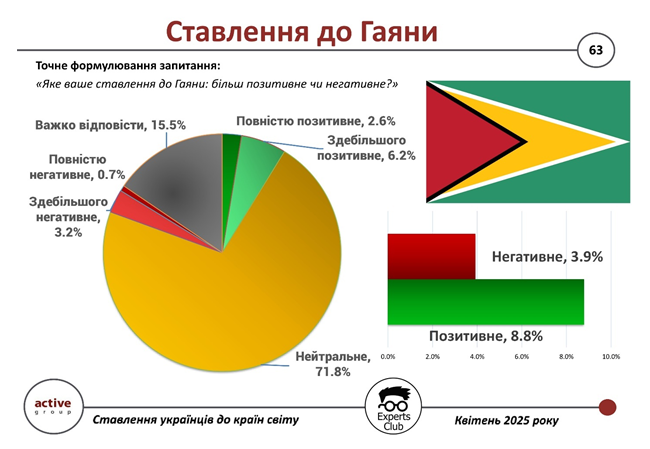
A positive attitude was expressed by 8.8% of respondents: 6.2% said “mostly positive” and 2.6% said “completely positive.” In contrast, only 3.9% expressed a negative attitude (of which 3.2% said “mostly negative” and 0.7% said “completely negative”). At the same time, 15.5% of respondents were unable to answer this question at all.
“Such a high percentage of neutrality and ‘difficult to say’ responses indicates that Ukrainians are very poorly informed about Guyana. This country is almost absent from the Ukrainian information field and is therefore perceived without strong emotions,” comments Oleksandr Pozniy, co-founder of Active Group.
Ukrainians’ attitude toward Guyana remains largely neutral due to the country’s lack of media presence. This is a typical example of a “blank spot” on the geopolitical map in the mass consciousness.
The presentation of the study is available at the link.
ACTIVE GROUP, DIPLOMACY, EXPERTS CLUB, Pozniy, SOCIOLOGY, URAKIN

Agriculture is among the industries with the greatest shortage of personnel. Currently, almost 39% of agricultural companies in Ukraine face difficulties in finding staff, according to the study “Assessment of the Labor Market in Ukraine 2024–2025,” conducted by Helvetas Ukraine in cooperation with the State Employment Service and the Federation of Employers of Ukraine.
“In all the surveys we conduct among UAA members, labor market issues consistently remain among the most pressing. This primarily concerns staff shortages, especially qualified specialists. But to be honest, the main problem is mobilization,” said Dmytro Kokhan, deputy chairman of the All-Ukrainian Agrarian Council, during the presentation of the study.
He stressed that the defense of the country and the protection of Ukrainian land are undoubtedly a priority. At the same time, the agricultural sector, like many other sectors of the economy, is acutely feeling the pressure on human resources caused by mobilization processes. Urbanization and the outflow of young people from rural areas are significant challenges for the agricultural sector, making it difficult to find workers locally.
“It is a big challenge to attract young people to agriculture. But we are already working at our level: the All-Ukrainian Agrarian Council, together with SvitOsvit, has introduced the Agrosphere educational program in schools. This is an optional course that introduces students to the modern agricultural sector. It is currently being implemented in 150 schools, with another 85 teachers undergoing training so that next year we will cover more than 230 educational institutions,” said the deputy head of the UAA.
Kokhan also drew attention to the problem of the quality of vocational education.
“The agricultural machinery used by our enterprises changes radically every five years. But educational institutions often lack modern material and technical resources. If a teacher shows students old models of equipment, but the company needs to work with modern ones, it takes another year and a half to train the employee on the job. The state must invest in education and develop it in partnership with business,” concluded the UAA representative.
About 55,000 employers, who provide jobs for over 4.2 million people, took part in the study “Assessment of the Ukrainian Labor Market 2024-2025.”
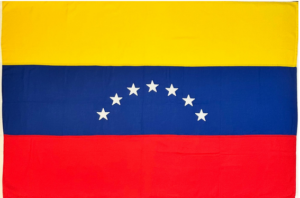
The results of a sociological survey conducted by Active Group in collaboration with Experts Club show that Ukrainians’ attitude toward Venezuela is generally more negative than positive.
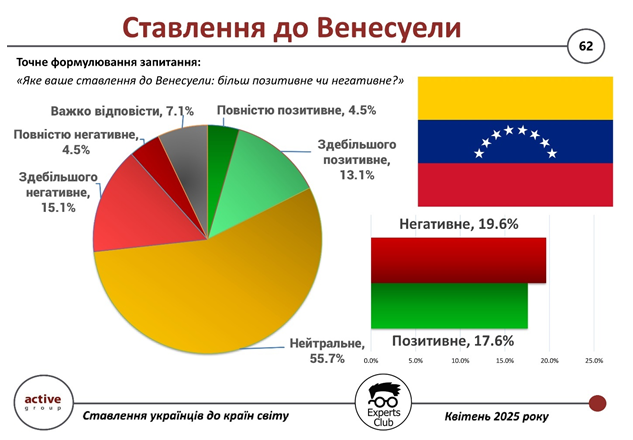
19.6% of respondents rated their attitude as negative, of which 15.1% said it was “mostly negative” and 4.5% said it was “completely negative.” At the same time, 17.6% of respondents expressed a positive attitude, including 13.1% who said it was “mostly positive” and 4.5% who said it was “completely positive.” The largest share, 55.7%, took a neutral position, while another 7.1% abstained from answering.
“Negative associations with Venezuela are mainly related to the economic and political crisis in the country. It often appears in the news as an example of a country where the socio-economic situation has deteriorated due to populist decisions. This creates a wary attitude among Ukrainians,” says Maksim Urakin, PhD in Economics and founder of the Experts Club information and analytical center.
Ukrainians perceive Venezuela mainly through the prism of problems that have become known from international news. Although a significant proportion of respondents take a neutral position, the negative image prevails over the positive.
ACTIVE GROUP, DIPLOMACY, EXPERTS CLUB, Pozniy, SOCIOLOGY, URAKIN